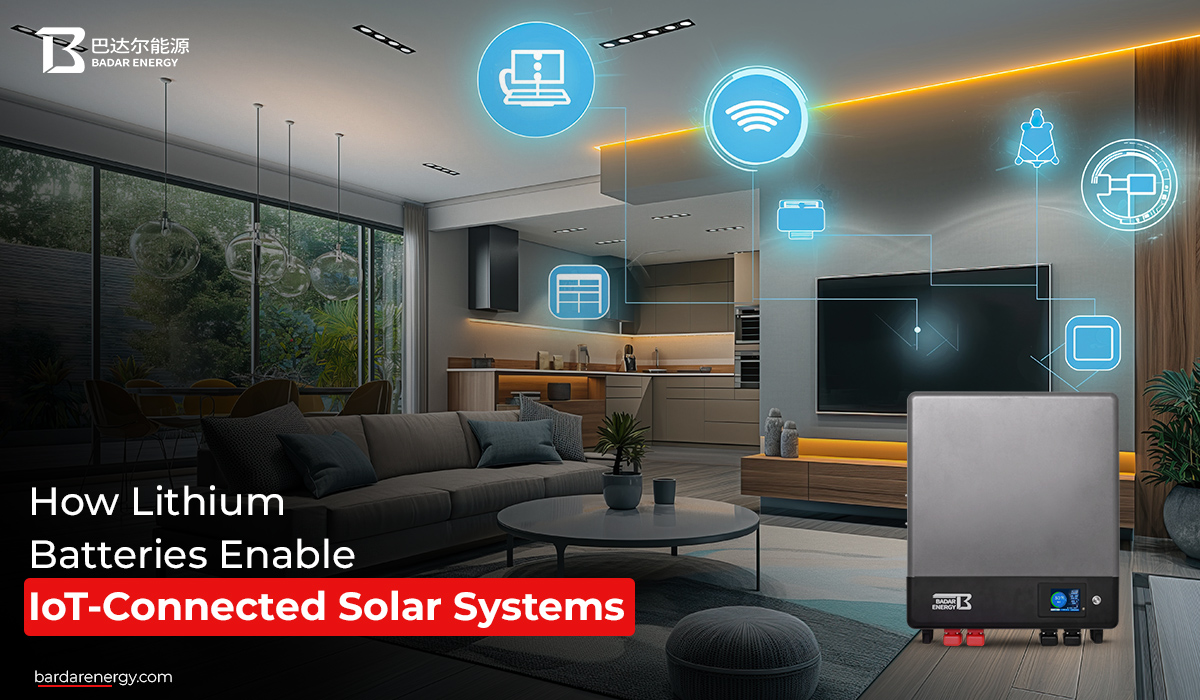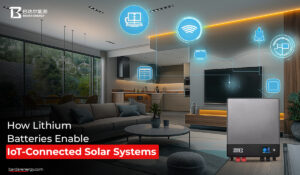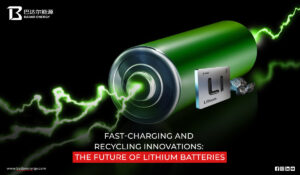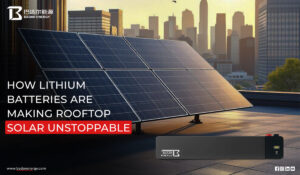The world of energy is quickly changing. Solar power, advanced storage, and the IoT are merging. This powerful combination is revolutionizing power generation. It is also transforming how we store and consume electricity. Lithium batteries are central to this transformation. They are the silent enablers of truly smart solar systems. These systems are highly efficient and reliable. You must understand the pivotal role of lithium batteries. They are vital in IoT-connected solar systems. Badar Energy stands at the forefront of this innovation. Our solutions are the ones that will fuel the entire world towards a greener future.
The Rise of Smart Solar: More Than Just Panels
Solar panels used to be a simple, non-interactive asset. They generated power only when the sun was shining. Any excess power had two fates. It either fed back into the grid. Or, it was lost without adequate solar energy storage. This traditional method was effective, but it lacked optimization. It also missed real-time responsiveness.
Now we introduce the Internet of Things (IoT). We embed small sensors into solar infrastructure. We add connectivity and data analytics tools. This turns passive energy generators into active participants. They become intelligent components in your energy ecosystem. IoT in solar energy brings many new capabilities. This results in truly smart solar systems.
These smart systems can monitor performance constantly. They track energy generation and consumption precisely. They also track the battery status in real-time. Systems can predict your future energy needs. They analyze past data and weather forecasts. This helps them optimize charging and discharging cycles. Operations become automated and simplified. You can adjust settings remotely from your device. The system can detect faults automatically. It can even perform necessary predictive maintenance.
These intelligent systems integrate with smart homes. They also connect with larger utility grids. They communicate with other smart devices easily.
Why Lithium Batteries are the Backbone of IoT-Connected Solar
Many chemistries exist for energy storage today. However, lithium-ion batteries have become the clear leader. They are the dominant choice for modern smart solar systems. This is due to their unparalleled set of advantages.
1. High Energy Density
Lithium batteries store great amounts of energy. They do this in a much smaller package. They are also lighter than older lead-acid batteries. This high energy density is crucial for IoT integration. It is important in homes and limited commercial spaces. A compact battery bank uses space efficiently. It is easier to integrate into existing structures. For instance, a homeowner can install a sleek unit. A wall-mounted Badar Energy lithium battery system integrates well. It looks great with a modern smart home aesthetic. This is better than a huge, bulky lead-acid bank.
2. Deep Cycle Capability and Longer Lifespan
Lithium batteries handle deep discharges without issue. This practice does not significantly shorten their lifespan. This deep cycle capability is vital for solar use. Batteries are regularly cycled for power. They cover energy needs during non-sunny hours. They also offer a much longer overall cycle life. They often last for thousands of cycles easily. This delivers a superior return on your investment. It also reduces replacement costs over time. An IoT-connected energy solution needs steady performance. Lithium battery technology provides this reliability every time.
3. Faster Charging Capabilities
You want to capture energy quickly. This is true when the sun is shining brightly. Lithium batteries accept a higher charge rate instantly. They can fully charge much faster than lead-acid types. This is extremely beneficial on partly cloudy days. It also helps when a quick recharge is necessary. This prepares the system for upcoming high demand periods. IoT systems use this feature perfectly. They precisely time the charging cycles. This maximizes energy capture during all optimal solar conditions.
4. Integrated Battery Management Systems (BMS)
This is the most critical feature for IoT compatibility. All modern lithium batteries include a sophisticated BMS. This system acts as an electronic protector. It constantly monitors several vital parameters.
- Voltage and Current: This makes sure that the battery does not get pushed to hazardous operation levels.
- Heat: This eliminates over heating and ensures optimal operations.
- State of Charge (SoC): This provides remarkably precise measurements with regard to smart energy control.
- Cell Balancing: This maintains a uniform charge across all internal cells. This is essential for long-term battery health.
The BMS is the key communication hub. It allows the IoT system to easily “talk” to the battery. It provides crucial real-time data flow. This data helps the smart controller make informed decisions. It controls charging, discharging, and overall optimization. Without the data from the BMS, true IoT-connected energy solutions cannot function.
Badar Energy: Powering the Future of Smart Solar
Badar Energy understands this energy future. We know solar is becoming highly intelligent and connected. Our focus on top-tier lithium batteries is critical. It enables all these advanced systems to work. Our solutions integrate smoothly with various IoT platforms. This gives customers unprecedented control and insight. They see everything about their energy usage.
Imagine a simple, smart scenario. Your Badar Energy system is online. It communicates with your smart home thermostat. The system could pre-cool your house automatically. It uses stored solar energy for this action. This happens before expensive grid peak prices begin. Or, if a severe storm is forecasted, the system acts fast. It prioritizes fully charging the battery bank. This ensures your backup power is ready to go. This level of sophistication requires two things. It needs reliable lithium battery technology. It also needs robust IoT connectivity and data flow.
Enhancing Solar Panel Efficiency with Smart Storage
Solar panel efficiency is about generation only. It converts sunlight into pure electricity. But how that power is then managed is the real key. It determines the overall effectiveness of your entire system. A smart, IoT-connected system with lithium batteries maximizes this effectiveness.
It minimizes wasted energy, known as curtailment. It stores all excess energy instead of losing it. It significantly optimizes the rate of self-consumption. You use your own generated power much better. It heavily reduces your overall reliance on the main grid. This directly lowers your monthly electricity bills. It also increases your personal energy independence. Plus, it provides resilient and trustworthy backup power. This ensures your supply remains constant during any outage.
The Synergy: IoT and Lithium Batteries in Action
Let us examine a practical, working example. See how lithium batteries and IoT combine perfectly. They create truly intelligent and smart solar systems.
- Generation: The solar panels efficiently capture the sun’s energy. This clean energy is now available in your system.
- Storage: A Badar Energy lithium battery bank stores excess energy. This is power that you do not immediately use. The integrated BMS constantly monitors battery health. It checks all performance metrics for you.
- IoT Connectivity: Sensors and a main gateway gather all data. This data comes from the panels and the battery BMS. It also checks your household energy meters. This collected data is sent instantly to a secure cloud platform.
- Intelligence: The cloud platform analyzes the incoming data streams. It reviews weather forecasts from external sources. It also considers current grid electricity tariffs.
- Action: The smart IoT system sends commands instantly. These commands go to your solar inverter and battery charger. It may tell the battery to discharge power. This happens when the electricity rates are peaking. Or, it may tell it to charge quickly. This prepares the battery for anticipated cloudy weather. Users can access this information easily. They control the system via a simple smartphone app interface.
This continuous, closed-loop process is key. It ensures your energy production is always optimized. Your energy consumption is also carefully managed. This delivers maximum cost savings every month. It also ensures you have complete energy independence.
Conclusion
The integration of lithium batteries and IoT is critical. It is much more than a simple technology trend. This strong partnership defines the future of energy today. Demand is only growing for better solutions. People want energy that is sustainable, reliable, and very smart. The necessary synergy between these technologies will only continue to grow.
Badar Energy is devoted to excellence and quality. We provide advanced lithium battery technology constantly. We empower every customer to use solar power fully. Invest in our IoT-connected energy solutions today. You are investing in much more than a piece of hardware. You are choosing a smarter, efficient, and sustainable energy future.




